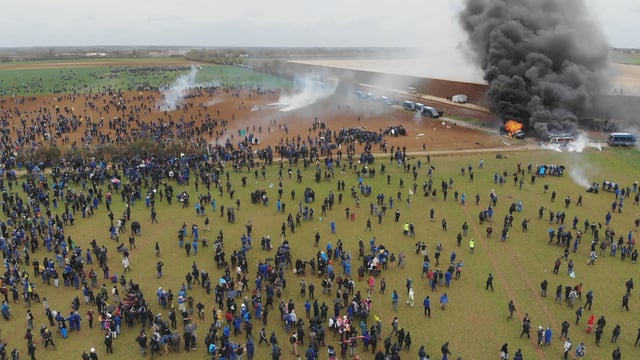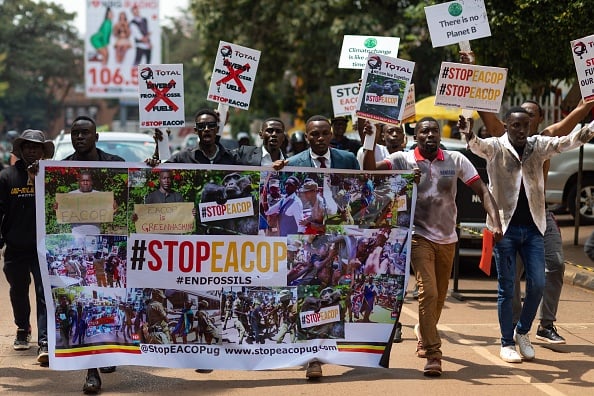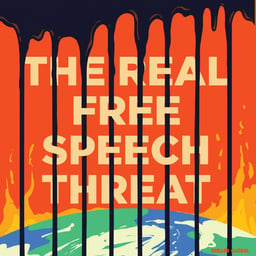
This project was supported in part by the Fund for Investigative Journalism, and co-published with The Guardian.
The Department of Homeland Security monitored anti-Cop City web posts and shared their surveillance findings with Atlanta police and the Georgia Bureau of Investigation for months leading up to a crackdown starting in December 2022 that saw more than 40 forest defenders, protesters, and organizers charged with domestic terrorism.
The federal analysts’ reports, obtained via a public records request, concluded that property damage in the name of stopping Cop City was consistent with “anarchist violent extremist” and “environmental violent extremist” ideologies. A separate report from the National Counterterrorism Center, a federal organization that brings together terrorism specialists from various agencies, contained a similar conclusion.
The records, uncovered by Drilled and The Guardian, provide new details about how DHS and other federal agencies laid the groundwork for Georgia to charge people camping in the woods as terrorists under a state law, and reflect a wider national and global crackdown on protest. The new materials show how evolving ideas about an eco-terrorist threat met a movement aimed directly at cops and turned into one of the most severe crackdowns against environmental activists in a generation. The bulk of the reports come from agencies established in the wake of the 9/11 attacks. They demonstrate how, more than 20 years later, a turn-of-the-century flood of terrorism funding continues to shape law enforcement’s response to environmental activists.
The Atlanta terror defendants are part of a wide-ranging movement to stop construction of a $90 million police training center known officially as the Atlanta Public Safety Training Center and colloquially as Cop City. Movement participants argue that the project would set up Atlanta officials to manage the city’s most vulnerable community members with more policing, instead of investments in affordable housing, education, healthcare, and accessible green space. They describe the movement as an effort to thwart the transformation of Atlanta into a city structured to benefit large corporations and upper middle class transplants, at the expense of longtime Black and working class residents. The training center is being built on an 85-acre plot of land in the South River Forest, an area near downtown Atlanta that had been included in plans for an expanded parks system, and spearheaded by the Atlanta Police Foundation, through which global corporations like The Home Depot and Coca-Cola funnel donations to police.
The first time Vienna Forrest heard that police were describing activists like her as eco-terrorists, “It seemed like an improbable joke to us,” she said. It was the summer of 2022, and she had recently begun living in the woods in a tent alongside other Cop City opponents who referred to themselves as forest defenders and were attempting to block construction of the police training center. Some forest defenders appear to have participated in property destruction or built barricades to keep police or private security from evicting them. The wider Stop Cop City movement also included community members who spoke out at meetings, held rallies, or distributed petitions outside of the forest.
At the protest encampment Forrest met and fell in love with an activist known as Tortuguita, whose legal name was Manuel Paez Terán.
Want to listen to this story and hear directly from Forrest and other activists caught up in the Cop City sweep? Check out the companion podcast episode to this story:
Over a year later, she has a much more somber take on what it means to be called an “eco-terrorist.” Forrest spent last Christmas in jail awaiting a bond hearing, after being arrested in the woods and charged under Georgia’s domestic terrorism law, which was drafted with mass murderers in mind. Then, during a January police eviction in the forest, state troopers shot and killed, 26-year-old Terán, claiming that Terán fired first. There were no witnesses besides police as officers shot Tortuguita 57 times in the head, torso, hands and legs.
The Georgia Bureau of Investigation, one of the recipients of DHS’s extremism analyses, briefed the officers in advance that they would be facing no less than domestic terrorists, according to records obtained by Rolling Stone.
As the year progressed, more Cop City protesters were charged with domestic terrorism. Then, in May three organizers who operated a bail fund were charged with charities fraud and money laundering. Their arrest affidavits also included language stating that DHS had designated Defend the Atlanta Forest as domestic violent extremists. Governor Brian Kemp claimed in a statement that the nonprofit workers “facilitated and encouraged domestic terrorism.”
More recently, in September 2023, the Georgia attorney general charged 61 Cop City opponents, including Forrest and most of the other terror defendants, with criminal racketeering, under a law designed to take down organized crime. “To think of us as some evil masterminding company organization is just ridiculous to me,” Forrest said. “If you've ever been in the forest, organization is not the word I would use for it.” The indictment included formal domestic terrorism charges for only five of those arrested as terrorists. The rest remain in limbo.
At the time of their arrest, law Georgia Bureau of Investigations officers justified 14 of the forest defenders’ terror charges by stating that the federal Department of Homeland Security designated Defend the Atlanta Forest as “Domestic Violent Extremists.” The arrest affidavits said that the group had taken responsibility, via web posts and graffiti, for committing vandalism and arson, throwing Molotov cocktails and fireworks, and blocking access to private land.
As all this unfolded, DHS repeatedly told reporters that the agency doesn’t classify any groups as domestic violent extremists. However, bulletins released around the same time indicated they did consider some Cop City opponents to be extremists.
In May 2023, about a week before the bail fund organizers were arrested, DHS released a National Terrorism Advisory System bulletin referring to Cop City opponents as “alleged DVEs.” Additional records, first published by Unicorn Riot, showed that the FBI was labeling Cop City opponents as anarchist- and environmental violent extremists by August 2022.
The conflicting messages drew the attention of Sen. Raphael Warnock and some of the nation’s largest civil rights organizations, who wrote letters this summer to Secretary of Homeland Security Alejandro Mayorkas requesting more information and guidelines. They demanded that the agency publicly disclose “all information and DHS intelligence or situational awareness reports that DHS provided to Georgia state and local law enforcement.”
The records received in response to our request help shed some light on the situation. They provide some of the only details about how DHS communicated with Atlanta officers in the months before the charges were filed.
The DHS files are Open Source Intelligence Reports, a type of surveillance product that has repeatedly come under scrutiny, including in a report by the Brennan Center for Justice. OSIRs contain “raw unevaluated information” and do not go through the same vetting process as other DHS reports. The top of each report includes a statement saying, “This information may not be used as the basis for any U.S. legal process,” including, “incorporation into affidavits or other documents relating to subpoenas, search, electronic surveillance, or arrest warrants; and/or as evidence in criminal prosecutions.”
“DHS’s communications undoubtedly contributed to Georgia authorities’ harsh crackdown on the Stop Cop City movement,” said Charlie Hogle, staff attorney with ACLU’s National Security Project, in an emailed statement. “The documents reinforce our concerns about DHS’s overbroad and stigmatizing use of ‘domestic violent extremism’ and related labels, which has long resulted in unwarranted surveillance, investigation, and even prosecution of environmental and racial and social justice activists.”
In an emailed statement, DHS said again that it, “does not classify or designate any groups as domestic violent extremists.” The DHS official continued, “The Department is committed to preventing all forms of terrorism and targeted violence, and does so in ways that protect privacy, civil rights, and civil liberties, and that adhere to all applicable laws. To that end, DHS regularly shares information regarding the heightened threat environment with federal, state, local, tribal, and territorial officials to ensure the safety and security of all communities across the country.”
The agency pointed out that the Office of Intelligence and Analysis, which produces the OSIRs announced in May 2023 that it was undergoing an overhaul to increase oversight.
The Georgia Bureau of Investigation referred The Guardian and Drilled to Georgia Attorney General Chris Carr’s office. Carr did not answer any questions about DHS and only addressed the most recent indictment. “We have continued to defend the First Amendment right to peacefully protest, but protestors use words. Violence is not ‘speech’ and will not be tolerated in Georgia. This case is about serious allegations of Domestic Terrorism, Arson and Money Laundering,” Carr’s statement said. “To suggest this is about peaceful protests is absolutely absurd.”
Documents received in response to public records requests also reveal that the Atlanta Police Department was routinely fed reports by federal agencies and academic institutions examining, defining, and debating the nature of ecoterrorism. The emailed reports even include a draft school paper titled “Criminal Hippies or Climate Change Heroes,” by a Homeland Security Officer for the Atlanta Fire Department, who was taking a course at the Naval Postgraduate School. The paper analyzes whether the movement Defend the Atlanta Forest deserves to be labeled a “domestic terrorism ecoterrorist group.” The officer’s answer appears to be yes.
The Atlanta Police Department declined requests for comment on the records. The report’s author did not respond to a request.
A Growing Trend
In recent years, fossil fuel companies have repeatedly filed civil lawsuits invoking the federal Racketeer Influenced and Corrupt Organization (RICO) act against environmental activists and their supporters. Targets like Greenpeace say the suits are meant to smear the organizations’ names, drain them of resources, and chill activism. However, cases of public officials filing criminal RICO charges against activists are exceedingly rare in the U.S., and there is no recent precedent for charging over three dozen environmental protesters with domestic terrorism.
Lauren Regan, director of the Civil Liberties Defense Center, which is providing legal defense for some Cop City opponents, underlined that the DHS documents do not confirm that the agency had officially classified forest defenders as extremists the way Georgia claimed. She and other critics have suggested that the idea of eco-terrorism exists only to criminalize disruptive environmental activism. “Far right extremists and their water carriers have used that phrase for an incredibly wide swath of anything that they don't like, whether it is very traditional civil disobedience or whether it engages in economic sabotage,” she said. “It is all being dumped into this label called eco-terrorist, which is basically just a slanderous term.”
In the months leading up to the terrorism charges against Cop City protestors, the idea that Forrest and her friends were eco-terrorists was swirling around law enforcement communities in Atlanta. The question was so much in the air that Nick Golden, Homeland Security Officer for the Atlanta Fire Department, made it the topic of his school paper “Criminal Hippies or Climate Change Heroes,” for a class at the Center for Homeland Defense and Security at the Naval Postgraduate School in Monterey, California.
Golden’s draft report, dated July 29, 2022 repeatedly referred to Defend the Atlanta Forest members as eco- or environmental “terrorists.” In the piece, Golden looked back to the last time federal law enforcement aimed significant anti-terrorism dollars at environmentalists: a period that came to be known as the Green Scare. He cited my own work extensively, particularly a piece about how industry had lobbied law enforcement throughout the 1990s to pursue eco-saboteurs as terrorists. The corporate labor bore fruit in the wake of the 9/11 when new antiterrorism funding incentivized law enforcement to see terrorists everywhere. By 2005, the FBI considered ecoterrorism its No. 1 domestic terror threat and aggressively pursued eco-saboteurs, in some cases attaching terrorism enhancements to their sentences.
Golden declared, “Operation Backfire was an amazing success in the fight against ecoterrorism.” However, he added, “Ecoterrorism is very much so still alive and well in the US.”
That same July and August, the Department of Homeland Security’s Office of Intelligence and Analysis shared at least two intelligence reports about the forest defenders with the Atlanta Police Department and the Georgia Bureau of Investigation that seemed to align with Golden’s arguments. The “Open Source Intelligence Reports” say that anonymous web site administrators had posted blog entries whose authors described a tow truck being set on fire and took responsibility for putting spikes in trees to make them difficult to cut them down — all in the name of stopping Cop City.
“Posted content is consistent with the Anarchist Violent Extremist (AVE) and Environmental Violent Extremist (EVE) ideologies,” the DHS authors noted.
“Environmental Violent Extremism” is the federal government’s term for what Golden described as eco-terrorism. According to an August 2022 DHS report also sent to the Atlanta police, the agency defines the category as including, “Groups or individuals who facilitate or engage in the unlawful use or threat of force or violence, with intent to intimidate or coerce, in furtherance of political and/or social agendas by those seeking to end perceived exploitation or destruction of natural resources and the environment.” “Anarchist violent extremists” aim to advance “opposition to all forms of capitalism, corporate globalization, and governing institutions.”
The broad definitions don’t seem to require an “extremist” to actually commit violence against humans or to even damage property. To be “domestic terrorism,” the DHS definition says, an act needs only be “dangerous to human life or potentially destructive of critical infrastructure or key resources.”
In recent months, DHS’s Office of Intelligence and Analysis and its distribution of Open Source Intelligence Reports were the subject of a Politico expose and a report published by the Brennan Center for Justice. The OSIRs are meant to flag unverified “emerging” threats to local law enforcement and others and are based primarily on social media and Internet posts.
“There’s a tendency to use the office’s power to paint political opponents—be they left-wing demonstrators or QAnon truthers—as extremists and dangerous,” one of the Brennan Center report’s coauthors, Spencer Reynolds told Politico. During racial justice protests in 2020, for example, an OSIR spread unsubstantiated social media rumors, which were later discredited, that anarchist extremists had staged bricks around cities in order to fuel property destruction. Other OSIRs distributed information about journalists who published leaked, unclassified information.
In an email to Drilled, Reynolds, who is senior counsel for the center’s Liberty & National Security Program, said the OSIRs sent to Georgia are another example of DHS overreach. “I&A suggests that vandalism of a tow truck and ‘tree spiking’ are terrorism, when they are actually local issues that do not require the involvement of federal security resources.” He added that the current reforms are not enough. “Secretary Mayorkas should overhaul the unit’s mandate and activities to ensure that it can no longer target Americans based on political belief and ideology and disseminate unverified social media posts in the guise of intelligence—misdeeds it has engaged in time and time again across political administrations.”
It's unclear how widely the federal agency’s environmental extremism labels circulated. A DHS official emailed the open source intelligence reports to an investigator for the Atlanta Police Department’s homeland security intelligence unit, along with an intelligence analyst for the Georgia Bureau of Investigation, and a police officer who managed the Atlanta Police Leadership Institute, a training program associated with the Atlanta Police Foundation.
The Antiterrorism Boom
Golden’s paper and the DHS reports were the result of the same post-9/11 antiterrorism boom that paved the way for the Green Scare in the early 2000s. Both DHS and Golden’s school program, the Center for Homeland Defense and Security, were established in the immediate wake of the trade center attack, when the center’s founders recognized that an “enormous funding stream” from the federal government was about to be unleashed.
In the wake of 9/11, a constellation of federal government agencies and academic institutions emerged to collect and exchange information about potential terrorist threats, especially to so-called “critical infrastructure,” a sprawling term that can include anything from oil pipelines to banks to government buildings. Although environmental activists have never been anywhere close to the top drivers of deadly, ideologically motivated attacks, today they are routinely included in terrorism analyses exchanged at all levels of government — including an array of reports sent to the Atlanta Police Department.
Atlanta Officers also received quarterly issues of The Searchlight, a magazine-style bulletin dedicated to “violent extremist threats to critical infrastructure" first published in 2021 by the National Counterterrorism Center, another agency born in the wake of 9/11. The September 2022 issue described anonymous online posts that took credit for anti-Cop City destruction of construction vehicles and office buildings in Birmingham, Alabama, and Albany, New York. Like DHS, the NCTC labeled the activity as “Anarchist- and Environmental Violent Extremist–Related Attacks.” The article was placed on the same page as a blurb about ISIS members blowing up electrical infrastructure in Afghanistan.
A spokesperson for the National Counterterrorism Center said, "The National Counterterrorism Center's mission is to protect the United States by analyzing, integrating, and sharing terrorist threat-related information with partners.” She added, “NCTC primarily focuses on addressing international terrorism threats, though also provides support to the Department of Homeland Security and Federal Bureau of Investigation as the government leads for countering domestic violent extremism.”
Not all the eco extremism literature sent to officers indicated that so-called “environmental violent extremists” were terribly dangerous. A DHS Office of Intelligence and Analysis summary of “Domestic Violent Extremist Attacks and Plots in the United States From 2010 Through 2021,” listed white supremacists as by far the most common perpetrators, tied to 51 attacks and plots. Anarchist violent extremists and environmental violent extremists were low on the list, responsible for 10 and 6 incidents, respectively.
Similarly, the European Union Terrorism Situation and Trend Report 2022, which laid out the terrorism trends EU states were facing, made clear that “lone actors associated with jihadist and right-wing violent extremism” were considered the biggest threats. Hardly any left-wing or anarchist extremist incidents were worth recording, and the authors underlined that “numerous violent left-wing and anarchist extremist incidents,” like the torching of infrastructure, did not rise to the European Union’s definition of terrorism.
Even more dismissive of the eco-terrorist threat was a report by The National Consortium for the Study of Terrorism and Responses to Terrorism, a University of Maryland program also established post 9/11. Titled, “A Climate of Terror? Climate Change as a Potential Ideological Driver of Terrorism,” the report said that eco-fascists are more of a concern than eco-terrorists, and that there exists little public support for property destruction or violence in the name of the environment.
The report came with a warning, though. “We are ahead of the curve, but only just,” the author stated. “As more individuals suffer the consequences of climate change, we should expect increased radicalization and potential violence.” To manage the threat, the report recommends not increased policing and surveillance but “mainstream environmentalist policy solutions” like “divestment from polluting industries.”
Ultimately, the reports seemed to conclude that eco terrorism didn’t pose a major threat. Nonetheless, the constant debate helped assure that it was on the minds of law enforcement as they confronted an environmental movement aimed at police themselves.
Deadly Consequences
Forrest was in the woods serving as a medic the day she was arrested. That’s about all she could tell Drilled about the events leading up to her arrest, because of her pending legal case and the fact that she’s pursuing a collective defense with other people facing charges. Other terror defendants interviewed by Drilled were similarly circumspect.
Forrest did share what happened after her arrest. She was unworried at first. “I was like, ‘Oh, it's probably just going to be like trespass at the worst.’” When an official read her the terror charges, she remembers, “I still thought it was a joke, kind of hysterically trying to laugh at the darkness.”
Days went by in jail with no bond hearing. Then, on Christmas Eve she was separated into a solitary cell. No one would tell Forrest why she was there, but she suspected it was because she’s trans. As the days ticked by, she considered self harm. Finally, more than two weeks after the arrest, she was released on bond.
It's the kind of story that other terror defendants repeated to Drilled and the Guardian. Luke Harper, a 28-year-old who goes by Lucky, had never participated in a protest before he was charged with domestic terrorism at a concert in the forest in March 2023. He spent three months in jail, after bond was denied repeatedly.
Forrest, Harper and the other Cop City terror defendants still face uncertainty. Although many of them were indicted on RICO charges in September, and the complaint included a few cases of alleged domestic terrorism, no formal indictment has been issued for the majority of the domestic terrorism arrests. That may be in part because Georgia Attorney General Chris Carr’s office, which answers to Republican governor Brian Kemp, is steering the legal strategy without support from local prosecutors. Last June, DeKalb County District Attorney Sherry Boston withdrew from prosecuting the terror charges, citing disagreements with Carr’s office over who to charge, including concern about terror charges for a Southern Poverty Law Center staff attorney who was acting as a legal observer in the forest. Meanwhile, District Attorney Fani Willis of Atlanta’s Fulton County, who is famous for applying Georgia’s RICO law to former president Donald Trump as well as rapper Young Thug, has stayed out of the Cop City RICO case.
Whether or not the terrorism charges stick, those accused have faced serious consequences. Online bullies have doxed some terror defendants, posting information about their families, residences, and employers online. The terror label also provided fodder for right-wing critics who used it to amplify claims of growing leftwing violence — even though an analysis by Grist showed that most of the allegations in the RICO suit are tied to nonviolent actions.
The most severe consequence of the eco-terrorist label may have been saved for Terán.
Forrest was released with bond conditions that said she wouldn’t use social media to contact members of “Defend the Atlanta Forest.” Concerned, many of her friends avoided talking to her — but not Tortuguita. Although they hated leaving the forest, they would regularly stop by the house where Forrest was staying to make sure she wasn’t feeling left behind.
“The last time I saw Tortuguita, they took me and two friends to get Vietnamese and Mexican food and just get really full,” she remembered. “We went to this drive-in movie theater and watched a really shitty horror movie.” It was a Monday.
That Wednesday, terrorism was on the minds of the state troopers as they entered the forest. According to records obtained by Rolling Stone, they approached Tortuguita’s tent believing that “domestic-terror suspects were present on the property and known to be armed and extremely violent.”






